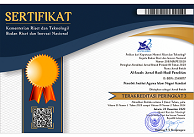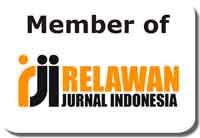PEREMPUAN DAN POLITIK LOKAL (STUDI KASUS PEMILIHAN KEPALA DAERAH DI SULAWESI TENGGARA)
Abstract
This qualitative study aimed to investigate the existence of women’s contestation in the local election in South East Sulawesi and to identify the female candidates’ effort to win the electoral competition. Data gathered from interview, observation, and documents were analyzed based on the analytical framework used. Findings of the study reveal that the contestation of female regency or major candidates has been of great consideration due to their previous strategic ruling position in the government, such as vice of major, head of the local house of representative, member of the house of regional representative, and local government secretary. Furthermore, the female candidates have a big chance to succeed in the election regarding that they have big force, and their offered programs are beneficial for women and marginal communities. These female candidates also involve more female volunteers’ force who is competent and potential in running activities along with women organization and aiming at empowering women communities.
Keywords
Full Text:
PDFReferences
Bakker, Anton dan Ahmad Charis Zubair, 1990, Metodologi Penelitian Filsafat, Yogyakarta: Kansius
Bari, Farzana, 2010. Womwn’s Participationin Politics and Government in Indonesia-A Policy Paper. Jakarta: UNDP
Bawaslu Sultra, 2016. Mengawasi Pilkada Serentak Untuk Penegakan Demokrasi Lokal, Kendari, Komunika.
Budiarti Aisah Putri, 2011, Politik dan Perempuan, Departemen Ilmu Politik Fak Ilmu Sosial dan Ilmu Politik Univ Indonesia.
Dahlerup, Drude, 1998. Using Quotas to Increasi Women’s Political Representation. “dalam Women in Parliament: Beyond Numbers. Azza Karam, Stocholm:IDEA, 141-147.
Gaffar, Janedjri M, 2013. Demokrasi Konstitusional, Praktek Ketatanegaraan Indonesia Setelah Prubahan UUD 1945, Jakarta: Konstitusi Press (Konpress).
Karam, Azza, 1998. Woment In Parliament: Beyond Numbers. Stockhom: IDEA.
Norris, Pippa, 2003. Increasing Women’s Representation in Government: What Option Would Work Best Of Afghanistan?. Paper untuk the Afghanistan Reconstruction Project, Center On International Cooperation, New York University.
Pande, Rohini dan Deanna Ford, 2011. Gender Quotas and Female Leadirship: A Review.http://scholar.harvard.edu/files/rpande/files/gender_quotas__april_2011.pdf(29Agustus 2016)
Phillips, Anne, 1995. The Politycs of Presence: The Political Representation of Gender, Ethicity and Rase. Oxford Univercity Press.
Prasetyo Teguh, 2017.Pemilu Bermartabat (Reorientasi Pemikiran Baru Tentang Demokrasi, Jakarta: Raja Grafindo Persada.
Shvedova, Nadezhda, 2005. Obstacles to Women’s Participation In Parliament”.dalam Women in Parliament: Beyond Numbers. Azza Karam, Revised Edition. Stockholm: IDEA.
Suswantoro Gunawan, 2016. Mengawal Penegak Demokrasi di Balik Tata Kelola Bawaslu & DKPP, Jakarta: Erlangga.
Strauss, Anselm dan Juliet Corbin, 20013. Dasar-Dasar Penelitian Kualitatif, Yogyakarta: Pustaka Pelajar.
Undang-Undang Nomor 10 Tahun 2016 Perubahan Kedua Undang-Undang Nomor 1 Tahun 2015 Tentang Penerapan Peraturan Pemerintah Pengganti Undang-Undang Nomor 1 Tahun 2014 Tentang Pemilihan Gubernur, Bupati Dan Walikota.
DOI: http://dx.doi.org/10.31332/ai.v14i1.1273
Copyright (c) 2019 Al-Izzah: Jurnal Hasil-Hasil Penelitian

This work is licensed under a Creative Commons Attribution-NonCommercial-ShareAlike 4.0 International License.










